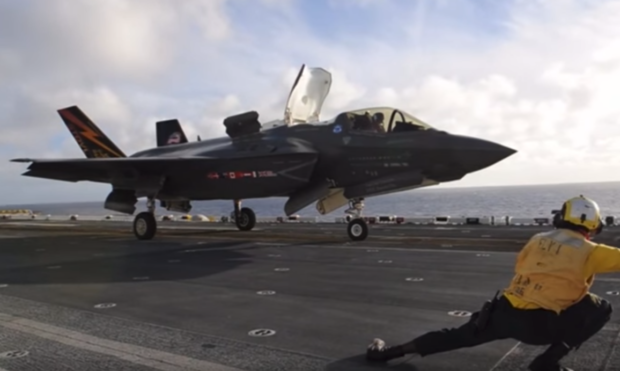Could the US Get Dragged Into Another Endless Conflict In The Middle East?

The escalating firefight between the Yemen-based Houthi rebels and U.S. forces in the Red Sea is not likely to simmer down until the Biden administration stops a cycle of self-sabotage that could lead to an extended conflict, experts told the Daily Caller News Foundation.
Biden administration officials, not to mention the rebel group itself, have acknowledged that the U.S. strikes on Houthi missile assets in Yemen will do little to dissuade them so far against continuing to attack international shipping in the Red Sea. Neither the administration nor experts see an imminent end to the hostilities, and the president has few other options aside from putting direct pressure on Iran, the source of the Houthis’ military capability, experts told the DCNF, as fears grow about the U.S. becoming entangled in more protracted hostilities in the Middle East.
“Are they stopping the Houthis? No. Are they going to continue? Yes,” President Joe Biden said Thursday after the latest round of self-defense strikes on missiles prepared to launch against commercial vessels.
Surgical attacks directed only against imminent attacks fall along well-worn paths as the Biden administration seeks to avoid actions Iran could perceive as provocative.
The Houthis will continue firing missiles and drones toward U.S. vessels indefinitely, experts told the DCNF.
“I think it’s going to last as long as the Biden administration continues to fight with one hand behind its back in order to make this stop,” Nathan Sales, the former State Department coordinator for counterterrorism, told the DCNF. “They shouldn’t be more afraid of us than we are of them, but right now I don’t get that sense.”
The Houthis vowed the aerial bombardment would not prevent their attacks, and expanded the scope of defined targets to include U.S. owned and operated vessels. Previously they said only shipping linked to Israel was under threat, although their attacks in reality do not appear to discriminate. More than 50 nations associated with cargo ships in the Red Sea and Gulf of Aden have been affected by the attacks, the Pentagon has said.
Playing whack-a-mole with individual Houthi capabilities is not a long-term solution, experts said. “A tit-for-tat strategy ensures the Houthis and Iran will continue to target shipping,” Bill Roggio, senior fellow at the Foundation for Defense of Democracies, told the DCNF, adding that the Houthis will most likely achieve what they hope to “until they pay a real price.”
An illusion of restoring the nuclear deal with Iran has pinned the administration’s into a corner when it comes to addressing the driving factor behind the Houthi strikes, according to Sales.
“The Houthis are the symptom and Iran is the disease. Until the administration is serious about restoring deterrence against Tehran, Tehran is going to continue to give the Houthis and other terror proxies… free rein to target the U.S. and commercial shipping,” Sales told the DCNF.
On Tuesday, U.S. Navy special operators in the Gulf of Aden seized Iranian weapons components headed toward the Houthi rebels in Yemen for the first time, the military’s Mideast command said in a statement Tuesday.
The U.S. has a self defense justification for going directly after Iranian assets, including an Iranian navy vessel that has been operating in the Red Sea and reportedly providing targeting intelligence to the Houthis, Sales explained. “We have all the cards. We’re just afraid to play them,” he said.
On Friday, the White House struggled to address why the Houthis do not appear to fear the U.S. “We don’t seek a conflict. There doesn’t need to be a conflict. But this exchange of fire that we’ve seen in recent days doesn’t have to go on one day more if the Houthis would make the right decision to stop the attacks,” White House national security spokesperson John Kirby said.
Kirby could not say why the U.S. retaliatory actions would not frighten the Houthis into abandoning their campaign of harassing shipping and countries’ navies in the Red Sea. “I don’t know what the alternative would be,” he said.
19JAN2024 Updated Infographic of Houthi Missiles, Drones, USV's, Manned boat launches, interceptions by Coalition Warships and Atalanta Threat update spreadsheet visualized.
Total Interceptions/Strikes by US and Coalition Forces.
3x ASCM
6x LACM
7x ASBM
79x Drones
3x Speed… pic.twitter.com/fwqaa7TuA9— Intelschizo (@Schizointel) January 19, 2024
Biden administration officials have reiterated that actions taken by the Pentagon, including sending U.S. Navy assets to the Red Sea, in the wake of the Oct. 7 Hamas attacks on Israel are meant to keep the conflict contained.
And, the Pentagon insisted Wednesday that the conflict between Israel and Hamas has not expanded throughout the region as violence escalated throughout the region following U.S.-led strikes on Houthi positions in Yemen and retaliatory attacks on U.S.-flagged merchant ships.
“The U.S. is trying to stop the war from spreading, but Iran seems to be intent on causing it to expand, which could draw the U.S. into a regional conflict,” Mick Mulroy, a former deputy assistant secretary of defense for the Middle East, Marine Corps officer and CIA paramilitary officer, told the DCNF.
On Wednesday, the administration officially moved to list the Houthis as a specially designated global terrorist group, a designation that allows the administration to impede terrorist funding to the group.
The U.S. and United Kingdom on Jan. 11 bombarded more than 60 targets, including warehouses for weapons and equipment, radars and missile launchers, with more than 150 munitions fired from ships, submarines and aircraft in the region. In a unilateral follow on action the next day after the Houthis fired upon another commercial vessel, U.S. destroyed a radar site associated with the attacks. The Pentagon has declined to provide an assessment of the damage, citing operational security and intelligence concerns, but the Pentagon’s top operations officer, Lt. Gen. Douglas Sims, said immediately after the strikes he was fairly confident the strikes impeded the Houthis’ ability to carry out attacks.
Military officials expected the Houthis to conduct retaliatory attacks against shipping and possibly U.S. vessels but said their ability to execute complex operations was likely degraded.
“I don’t believe that they would be able to execute the same way they did the other day,” Sims said, referring to a Jan. 9 incident involving multiple U.S. warships downing 24 drones, cruise missiles and ballistic missiles in a single attack. “But, we will see,” he added.
Pentagon deputy press secretary Sabrina Singh walked back that assessment slightly on Thursday. “I can’t say that they can’t, but they certainly have less capabilities than they did yesterday or the day before that,” she said.
“It is clear to me that the Houthis and their Iranian backers have no intention to stop attacks on commercial shipping or U.S. Naval vessels. I don’t believe the White House or the Pentagon thought that would be the case,” Mulroy told the DCNF.
The Houthis targeted and in some cases struck several commercial vessels in the ensuing week after the multi-nation counterattack, including for the first time a U.S.-flagged vessel, a U.S.-owned bulk carrier and a U.S.-owned tanker, according to U.S. Central Command (CENTCOM).
The U.S. also conducted five preemptive, self-defense strikes meant to immediately disrupt planned attacks after CENTCOM observed the Houthis preparing to launch missiles into the Red Sea, destroying at least 24 anti-ship missiles — the latest on Saturday, according to statements.
“We never said that the Houthis would immediately stop. That is something that they will have to make that decision and that calculation to do,” Singh said.
“It’s in their best interests, I think, to stop. You’ve seen that we’ve been able to degrade and severely disrupt and destroy a significant number of their capabilities since Thursday. But it’s really on them when they decide that they want to stop interrupting commercial shipping, innocent mariners that are transiting the Red Sea,” she added.
Content created by The Daily Caller News Foundation is available without charge to any eligible news publisher that can provide a large audience. For licensing opportunities of our original content, please contact licensing@dailycallernewsfoundation.org




